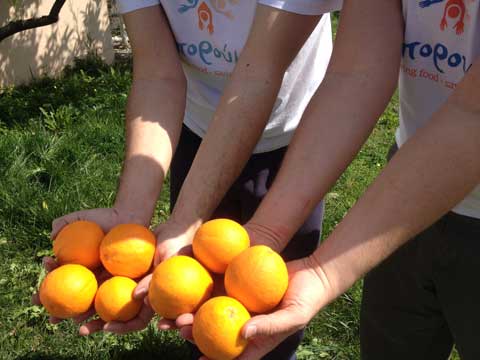- About
- Topics
- Picks
- Audio
- Story
- In-Depth
- Opinion
- News
- Donate
-
Signup for our newsletterOur Editors' Best Picks.Send
Read, Debate: Engage.
| November 04, 2019 | |
|---|---|
| topic: | Food Security |
| tags: | #Russia, #food embargo, #Vladimir Putin, #food security |
| located: | Russia, USA, Canada |
| by: | Igor Serebryany |
Total net losses of Russian customers amount to $42 bn. (2.65 trillion rubles) in five years since Putin's embargo came into effect in August 2014.
Fewer - Pricier - Flimsier
That sum is the total of almost all windfall profits of the Russian agricultural sector (84 percent), as well as a tiny (3-percent) profit of the food suppliers from the Russia-friendly countries like Belarus, Argentina, Chile, China, Uruguay. Thirteen percent of the losses have been counted as unrecoverable, the recent report of the Russian Academy of National Economy and State Service says.
The losses occurred because the shelf prices for the domestically-made foods have been higher than their foreign analogues. The only exception from the rule are tomatoes, pork and poultry. Those three positions saved the Russian customers about $120 million (75 bln rubles) a year, a tiny fraction compared to $8 billion.
Per capita, the losses amounted to about $4 per month. This is negligible for the people who earn enough. However, the 4-dollar "Crimean tax" has been quite tangible for those 20 million citizens living below the poverty line.
"Import substitution implies that a domestic producer would benefit from the removal of foreign competitors. Those expectations have, in general, materialised. The number of domestic sectors which stalled before 2014 because these enterprises were unable to compete with imports is very high", she says.
However, what is good for a producer not necessarily benefit a customer, the researcher continued:
"A farmer always is, understandably, self-interested. He doesn't care what is going on outside of his enterprise or, at most, his sector. If some product's price tag on the global market is 10 dollars and his is 15, why should he bother to cut the cost of production if there are no competing goods on the domestic market?", Volchkova explains. "Russian customers experienced a 13-percent loss due to the politically-illiterate food embargo, which triggered the launch of economically inefficient production chains".
Kremlin carpet-bombs the Russian economy
It was in 2017 when a deputy prime minister Igor Shuvalov "suddenly" realised that "counter-sanctions" flush out competition from the Russian national market. When the embargo is lifted, Russian farmers would face serious problems in the absence of the government protection measures, he lamented.
It is still unclear what the authorities can undertake to make the Russian agricultural sector competitive, a former head of the Economy and Financial Institute Valery Senkov says.
"Literate protectionist policy, including, well, counter-sanctions as its integral part, must support the hand-picked sectors of the national economy. Meanwhile, we witness the economic carpet bombing. The import embargo was imposed in the spirit of emergency, with no thorough analysis of its consequences. Well, they provided some life support for a limited number of agricultural enterprises, but in general they have been like flogging a dead horse", he says.
"The import embargo makes zero economic sense. To make the Russian economy competitive globally, the government must, in the first hand, return assets from off-shores, impose prohibitive tax on the flight of capital. Why western sanctions prevent the government doing that, no one knows", Senkov concludes.
Food shortages looming?
Despite the obvious negative impact of the food embargo on Russian customers, Vladimir Putin remains firm in his intentions to keep counter-sanctions in place. Moreover, in May 2018 he signed a decree demanding an increase of food exports to $45 bn from the current $24 bn by 2024, his final year in office.
The economists warn that demand can bring about food shortages on the Russian domestic market. This is because the export hike demanded outruns the growth of agricultural production in this country by about 10 percent.
To export agricultural goods for $45 bn while not washing the foods out of the shelves domestically, the growth of production must be at least four percent a year - far above the actual pace.
No one expects "holodomor" (mass hunger) may happen in Russia similar to that in 1930s, still national agricultural production has been in the risk zone, professor at the Institute of Economy in the Russian Academy of Science Ivan Starikov says.
"Russian agriculture is the last link in a production chain which originates abroad. Fertilisers, livestock supplements and other veterinary pharmacology are instrumental for modern agricultural production. Nearly all those substances are imported from abroad. When imports were banned, Russian farmers lost access to them", he says.
To fill the gap between food production slow growth and much faster-growing demand, the Russian food industry has to rely on various twists and turns.
"They cannot let the production figures shrink. So the industry dilutes every processed food possible with palm oil and other substitutes on an ever-growing scale. Statistically, food production grows. But its protein value constantly falls. Russian customers consume less protein and more artificial biochemical supplements with each passing year. This is a price they pay for counter-sanctions madness", Starikov says.
By copying the embed code below, you agree to adhere to our republishing guidelines.

